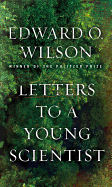
Two-time Pulitzer-prize winning biologist Edward O. Wilson's wonderful Letters to a Young Scientist draws on 60 years of research and teaching for a warm, spirited defense of science.
Wilson (Consilience; The Ants) intersperses personal anecdotes with advice and hard science to address a range of subjects. His explanation of the scientific method is a triumph of elegance in one of the book's best chapters. He praises the genius of religion and the humanities, but adds that science builds on their understanding of humanity's place in the universe by formulating the laws that explain its working.
Bursting with insight and contagious awe for the natural world, Wilson compares the practice of science with both entrepreneurship and storytelling: it relies on quick, easy experiments to assess potential ventures alongside the creative ability to plot research towards an imagined conclusion. Value both skills, he advises; recalling his boyhood fascination with insects, he encourages his readers to follow their passion and never to stop learning.
The book takes its title and approach from Letters to a Young Poet, Rilke's famous responses to a young poet seeking his advice. Wilson's book is ostensibly addressed to his students, but it also seems meant for general readers. As a result, the use of letters as the organizing device seems somewhat manufactured--the only dissonant note in this otherwise perfect little book. Letters to a Young Scientist is a celebration of science and the important discoveries yet to be made, expressing a generous belief in the contribution any aspiring scientist can offer. --Jeanette Zwart, freelance writer and reviewer

